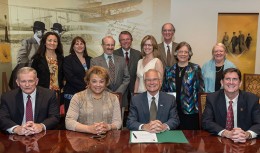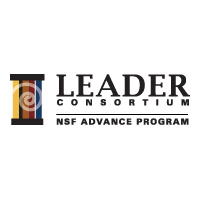
Wright State and three other institutions pledged to continuing recruiting more female faculty in STEM disciplines. They were represented by (from left): Todd I. Stewart, director and chancellor of the Air Force Institute of Technology; Central State President Cynthia Jackson-Hammond; Wright State President David R. Hopkins; and University of Dayton President Daniel J. Curran.
Wright State University and three other institutions of higher learning pledged to sustain an initiative to recruit more women to tenure-track faculty positions in STEM disciplines.
The leaders of Wright State, the University of Dayton, Central State University and the Air Force Institute of Technology signed a joint statement of cooperation May 30 to continue the work of the LEADER Consortium. They also vowed to work on a formal memorandum of understanding in the coming year to detail how they plan to grow the initiative’s successes.
The pledge was announced during a conference in the Apollo Room of Wright State’s Student Union that drew about 100 faculty and administrators from around the region.
“We must have a coalition of committed people; we have that within this LEADER Consortium,” said Wright State President David R. Hopkins. “We need to expand that.”
 The LEADER Consortium—or Launching Equity Across the Dayton Entrepreneurial Region—is a Wright State-led group of institutions that also includes the University of Dayton, Central State and the Air Force Institute of Technology.
The LEADER Consortium—or Launching Equity Across the Dayton Entrepreneurial Region—is a Wright State-led group of institutions that also includes the University of Dayton, Central State and the Air Force Institute of Technology.
The consortium has collected data on the number of female STEM faculty members at institutions and their workplace climates; established equity advisers who advocate for female faculty and provide information on hiring, evaluation, tenure and professional development; implemented programs designed to promote discussion of policies and practices; and organized large conferences that feature equity experts and promote conversations among administrators on what is needed for institutional change.
A 2008 National Science Foundation grant to support the initiative is coming to a close, and the coalition has been moving toward institutional sustainability.
Since the initiative began, the number of women in tenure-track roles across STEM fields has increased at all four institutions—with Wright State seeing a 33 percent increase.
Hopkins said ensuring faculty equity requires valuing differences between individuals, creating a sense of urgency by being open with data and celebrating early successes to build credibility for change.
“Change is really hard. We know it happens with leadership, collaborations, patience and a relentless commitment to make it happen,” Hopkins said. “Cultures change at the end
of changing policy, changing practices and sometimes changing people.”
The conference, titled “Institutional Transformation for Faculty Equity: Celebrating and Sustaining LEADER’S Success,” was organized by Stephanie Goodwin, Ph.D., consortium program director; and David Goldstein, Ph.D., consortium principal investigator and chair of the Wright State Department of Biological Sciences.
Speakers included Hopkins; University of Dayton President Daniel J. Curran; Central State University President Cynthia Jackson-Hammond; and Todd I. Stewart, director and chancellor of the Air Force Institute of Technology.
Keynote speaker was Abigail Stewart, Ph.D., distinguished professor of psychology and women’s studies and director of the women’s advancement program at the University of Michigan.
The number of female tenure-track faculty in the STEM disciplines at Michigan increased from 15 percent in 2001 to 23 percent in 2012, with the overall number of female employees increasing from 13 percent to 30 percent.
“We believe continued attention to the issue has made a difference,” Stewart said.
The university has expanded child care, family-friendly policies and dual-career resources and now regularly analyzes salary equity.
The audience peppered Stewart with questions, asking what strategies have been most effective, how departments that are slow to change can be changed and whether Michigan has reached a critical mass that will enable change in hiring and the university climate to be sustained.

 Wright State University celebrates Constitution Day
Wright State University celebrates Constitution Day  Nearly $3 million NSF grant positions Wright State to transform scrap metal recycling
Nearly $3 million NSF grant positions Wright State to transform scrap metal recycling  2025 President’s Award for Excellence in Human Relations
2025 President’s Award for Excellence in Human Relations  2025 President’s Award for Excellence in Leadership
2025 President’s Award for Excellence in Leadership  2025 President’s Award for Excellence in Service
2025 President’s Award for Excellence in Service 